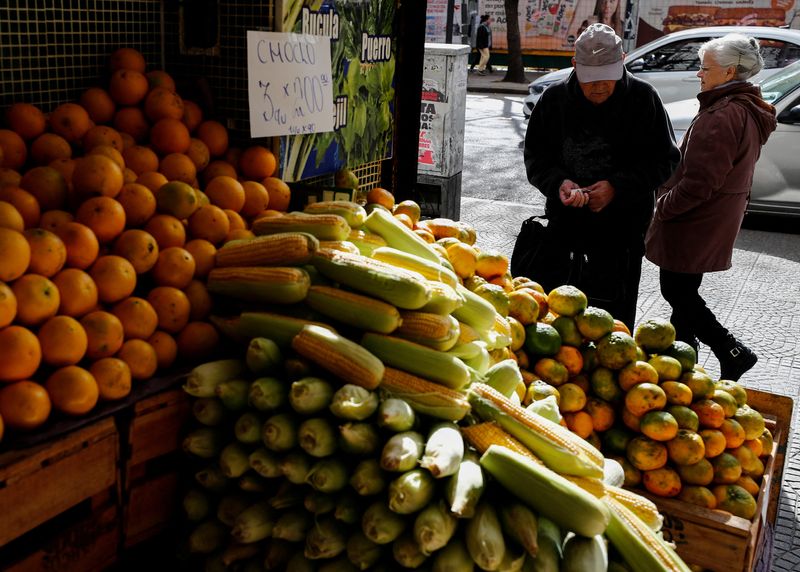© Reuters. FILE PHOTO: A customer counts money before buying tangerines at a green grocery store, as Argentines struggle amid rising inflation, in Buenos Aires, Argentina May 11, 2023. REUTERS/Agustin Marcarian / File Photo
By Miguel Lo Bianco and Jorge Otaola
BUENOS AIRES (Reuters) – Argentina’s annual inflation rate soared to 124.4 percent in August and hit its highest level since 1991, sparking a painful cost-of-living crisis in the South American country.
Soaring prices, which rose more than expected, are forcing the hardest-hit shoppers to make a daily effort to find deals and cheaper options, as price hikes leave big differences from store to store , with scattered discounts to attract buyers.
August’s monthly inflation reading of 12.4%, a number that would be overwhelming even as an annual figure in most countries around the world, is pushing poverty levels above 40% and stoking the anger against the traditional political elite ahead of the October elections.
“It’s very difficult. Every day things cost a little more, it’s like always running against the clock, looking and looking,” said Laura Celiz as she went grocery shopping in Tapiales, outside Buenos Aires. “Buy whatever is cheapest at one place and go to the next and buy something else.”
Her husband, Fernando Cabrera, 59, was doing sums on a calculator to compare fruit and vegetable prices.
“In this way we try to beat inflation or at least compete with it a little”, he added.
A poll of central bank analysts, released after the data, forecast inflation would end the year above 169%, up sharply from its estimate of 141% a month earlier. It predicted monthly inflation of 12% in September and 9.1% in October.
Argentina is caught in a cycle of economic crises, with a significant loss of confidence in the peso driving steady depreciation, triple-digit inflation, negative central bank reserves and a declining economy due to drought that affects agriculture.
The country is also struggling to save a $44 billion deal with the International Monetary Fund (IMF) and faces the prospect of a $16 billion legal bill following a US court ruling related to the ‘state acquisition of the energy firm YPF a decade ago.
‘PEOPLE ARE ANGRY’
That means a race to presidential elections next month, with radical libertarian Javier Milei as the favorite ahead of establishment candidate Economy Minister Sergio Massa and conservative Patricia Bullrich.
And inflation itself could get even worse amid election uncertainty, which has revived memories of the hyperinflation of the 1980s among those who lived through it.
“Some estimates say it could accelerate to 180%, so we’re talking about record inflation levels,” said local economic analyst Damian Di Pace, adding that other nations in the region were watching, meanwhile , fresh inflation.
“While the rest of Latin American countries have single-digit inflation, Argentina is already in triple digits.”
Massa, who has cut taxes to ease the impact of inflation on workers, said late on Wednesday that August had been the “toughest” month, pointing the finger at the IMF.
“The 20% devaluation of the currency, imposed by the IMF, we knew would reach the pockets of all Argentine families,” he said.
Business owners, who themselves face a complicated cycle of wholesale prices rising before they’ve shipped goods and been able to replenish, also suffer from product shortages due to inflation uncertainty.
Butcher Marcelo Capobianco, 53, fears having to close his business and is considering emigrating abroad. It shows meat prices in dollars, the currency that many use as a refuge from the constant devaluation of the peso.
“It’s dramatic. We don’t know how we’re going to pay the rent this month, how we’re going to pay the electricity,” Capobianco said at his butcher shop in Olivos, outside Buenos Aires. “People are angry and they have every right to be because they can’t afford to buy a kilo of meat.”
“We’re already thinking about what we’re going to do because, actually, if this continues, I think we’ll have to close,” he said.

